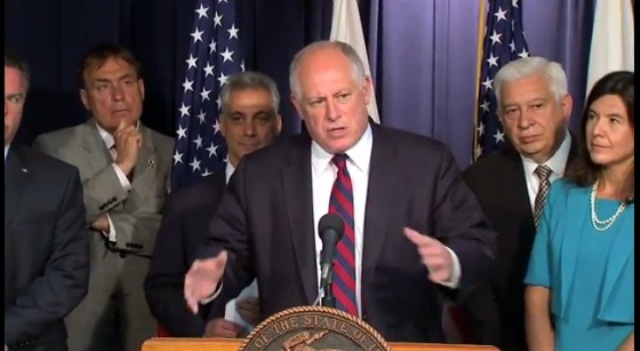Quinn Signs Legislation To Fight Street Gang Crime
By Chuck Sudo in News on Jun 12, 2012 2:25PM

Gov. Pat Quinn signed legislation into law on Monday that allows law enforcement agencies to target gangs with racketeering charges similar to federal RICO laws. Mayor Rahm Emanuel, Chicago Police Supt. Garry McCarthy and Cook County State's Attorney Anita Alvarez all lobbied Quinn to sign the bill in recent months as the city's crime rates have skyrocketed in 2012.
HB 1907 is modeled under federal RICO statutes and will treat crimes committed by street gang members as part of an ongoing criminal enterprise. Gang leaders convicted under the law could face more than 30 years in prison and fines of up to $250,000 or twice the gross amount of any criminal proceeds. Alvarez, who helped Springfield lawmakers in the drafting of the legislation, has already set up a gang RICO task force with the intention of breaking up street gangs from their leaders down. Chicago has an estimated 100,000 gang members, the largest population in the country. An estimated 75-80 percent of the city's homicide rate is believed to be gang-related.
Alvarez said the new law "will give local prosecutors the tools to identify and address patterns in multiple gang-related offenses and join different organized crime offenses and different offenders into a single court proceeding. Prior to the signing of this bill, state prosecutors were typically only able to charge individual gang crimes and rarely, if ever, were able to prosecute and hold gang leaders accountable for the organized activities of the street gang and its rank-and-file members.”
Emanuel, in a statement, applauded Quinn for signing the bill into law.
"This law will give local law enforcement the power to prosecute gang leaders for crimes that they ordered others to commit and provide a critical tool to dismantle the structure of gangs that are targeting our neighborhoods.”"
The question now is how aggressive will Alvarez and police be in implementing the law. As Greg Hinz at Crain's Chicago Business noted, there is a possibility law enforcement can overstep their bounds in implementing this. Former Police Supt. Jody Weis famously sat down with gang leaders in August 2010 to let them know he would hold them accountable for the actions of their foot soldiers. Quinn and other local politicians criticized Weis at the time for the summit. But Weis followed through on the ultimatum and was touting its success in his final days in office.
Illinois becomes the 32nd state in the nation with racketeering laws on the books.